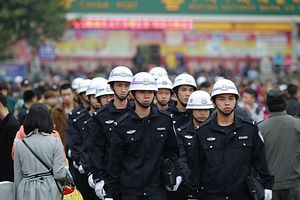After Chinese authorities recently detained female activists who were planning a protest against sexual harassment, a well-connected journalist friend of theirs told Foreign Policy that she was shocked by the news “because detention of young feminists in China was basically unheard of.”
But the arrests should not have come entirely as a surprise. The suppression of previously tolerated activities, topics, and individuals has been a distinguishing feature of the crackdown on civil society under Chinese Communist Party (CCP) leader Xi Jinping.
Since Xi took office in late 2012, the targets of censorship and offline repression have broadened beyond the “usual suspects” of the Hu Jintao period. Of 17 potential target groups identified by Freedom House researchers for a recent study, 11 experienced an increase in arrests, imprisonment, beatings, and other forms of abuse. Among the victims are people whose activities were until recently considered to be on the safe side of the party’s red lines: prominent social media commentators, civic-minded entrepreneurs, labor rights activists, and public health organizations, to name a few. Now women’s rights activists have joined that list.
The expanded crackdown has been effective at neutralizing some perceived threats to CCP rule. Public political debate and the agenda-setting capacity of microblogs are a shadow of what they were in 2011–12. Detentions have largely silenced charismatic, credible and popular critics like the activist lawyers Xu Zhiyong and Pu Zhiqiang, stalling the momentum of grassroots reformist initiatives like the New Citizens Movement.
But such “victories” for the regime come with real costs to the party’s legitimacy and hold on power.
First, as repression and censorship expand, the dark side of the party-state is touching the lives of more Chinese citizens. For example, content restrictions that were once experienced only by a small cadre of professional journalists are now a daily reality for tens of millions of internet users. Meanwhile, intrusive regulations that limit popular but apolitical activities – enjoying TV shows like The Big Bang Theory, using Google’s e-mail service, or dancing in public for exercise – provoke public ridicule and resentment. As restrictions increase, Freedom House research indicates that even some security personnel and censors have quietly grown more sympathetic to victims of political and religious persecution.
Second, by harshly punishing even those activists who try to work within the existing political and legal system, the CCP leadership is signaling that such efforts are futile, and that incremental change is not possible. This risks increasing the number of people who see direct confrontation and the end of one-party rule as the only solution. In a more extreme scenario, some may be inclined to turn toward violent resistance.
In fact, by expanding the targets of repression, the Xi leadership is engaging a risky departure from the party’s own survival strategies.
Scholars studying the resilience of CCP rule, particularly since the June 4, 1989, crackdown on Tiananmen Square protesters, have pointed to a combination of factors that have facilitated the party’s continued hold on power. These include rapid economic growth, retaining the loyalty of the military, and the systemic but carefully calibrated use of coercion.
To balance the need for coercion against the damage it can cause to legitimacy and other sources of resilience, the CCP has employed what one might term a “containment strategy.”
Its imperatives entail: (1) containing the targets (limiting the number of people subject to the harshest forms of repression); (2) containing the blame (shifting the blame for state violence against ordinary citizens to local officials or the victims themselves); and (3) containing the news (retaining control of the information landscape to restrict content deemed threatening to the party, but without suppressing all unofficial news).
The interplay between the different dimensions of this strategy has shifted under each generation of party leaders as they have responded to real or perceived threats to CCP rule, as well as social, economic and technological changes.
But now, sensing that its previous tactics were failing, the regime appears to be engaging in a more proactive and comprehensive quashing of dissent. And Xi’s attempts to assert centralized control over the security apparatus have exposed the highest echelons of the party to blame for the system’s abuses.
This reliance on repression leaves the CCP effectively trapped in a vicious circle. As the chilling effect induced by one crackdown fades, a new escalation is required. The severity of repression must be hidden to maintain legitimacy, motivating further censorship, but it must also be widely known to have a deterrent value, driving more serious crackdowns.
The unsavory dimensions of the party-state are thus colliding along a broader front with China’s increasingly educated, cosmopolitan, and assertive citizenry. With economic growth also slowing, the implicit social contract of the post-Tiananmen era – the creation of conditions for prosperity and personal consumer freedoms in exchange for the surrender of political and civic rights to the CCP – may begin to unravel, becoming palatable to fewer and fewer citizens.
When such disillusionment reaches a critical mass, the CCP could face a political crisis that makes the perceived threat from a handful of women’s rights activists pale by comparison. All the more reason why those interested in a genuinely stable China should be taking action now to secure their freedom.
Sarah Cook is a senior research analyst at Freedom House and author of the Politburo’s Predicament: Confronting the Limitations of Chinese Communist Party Repression.

































